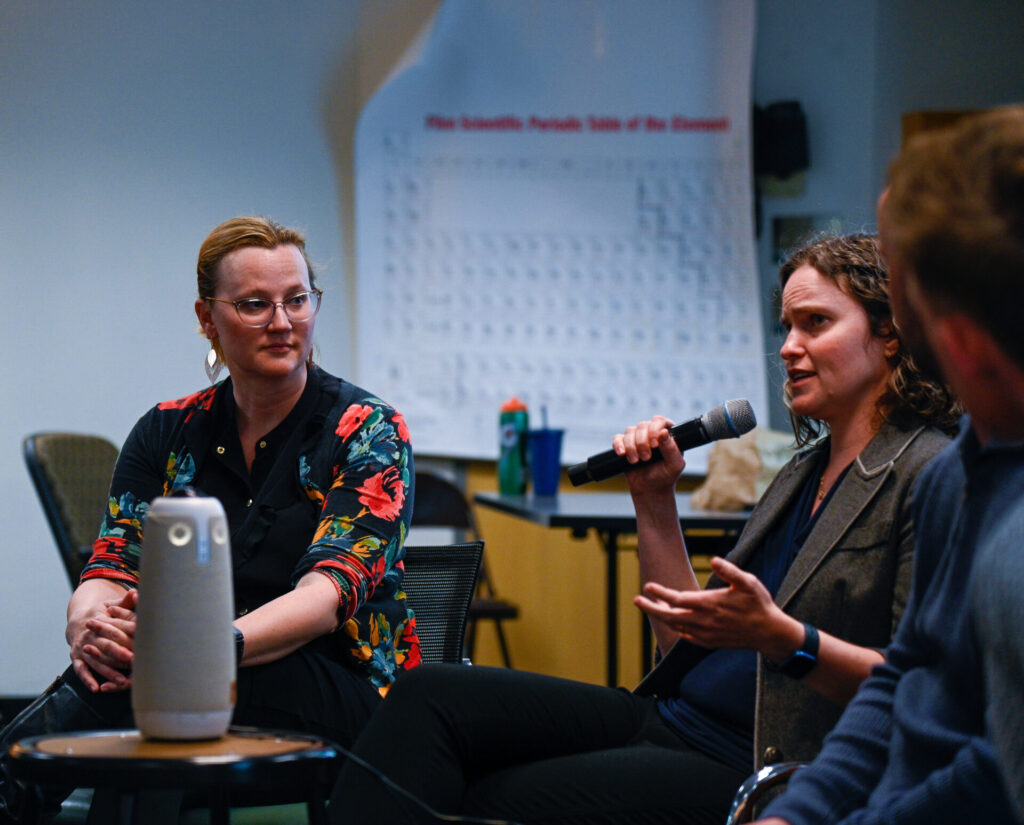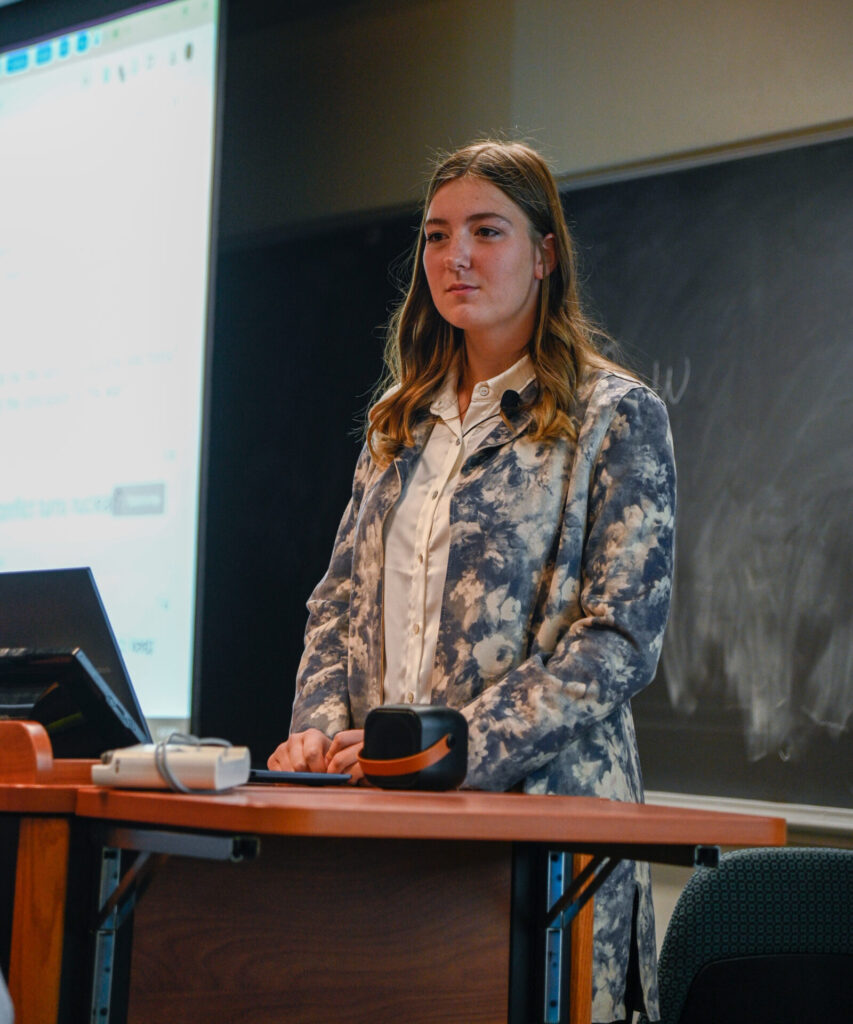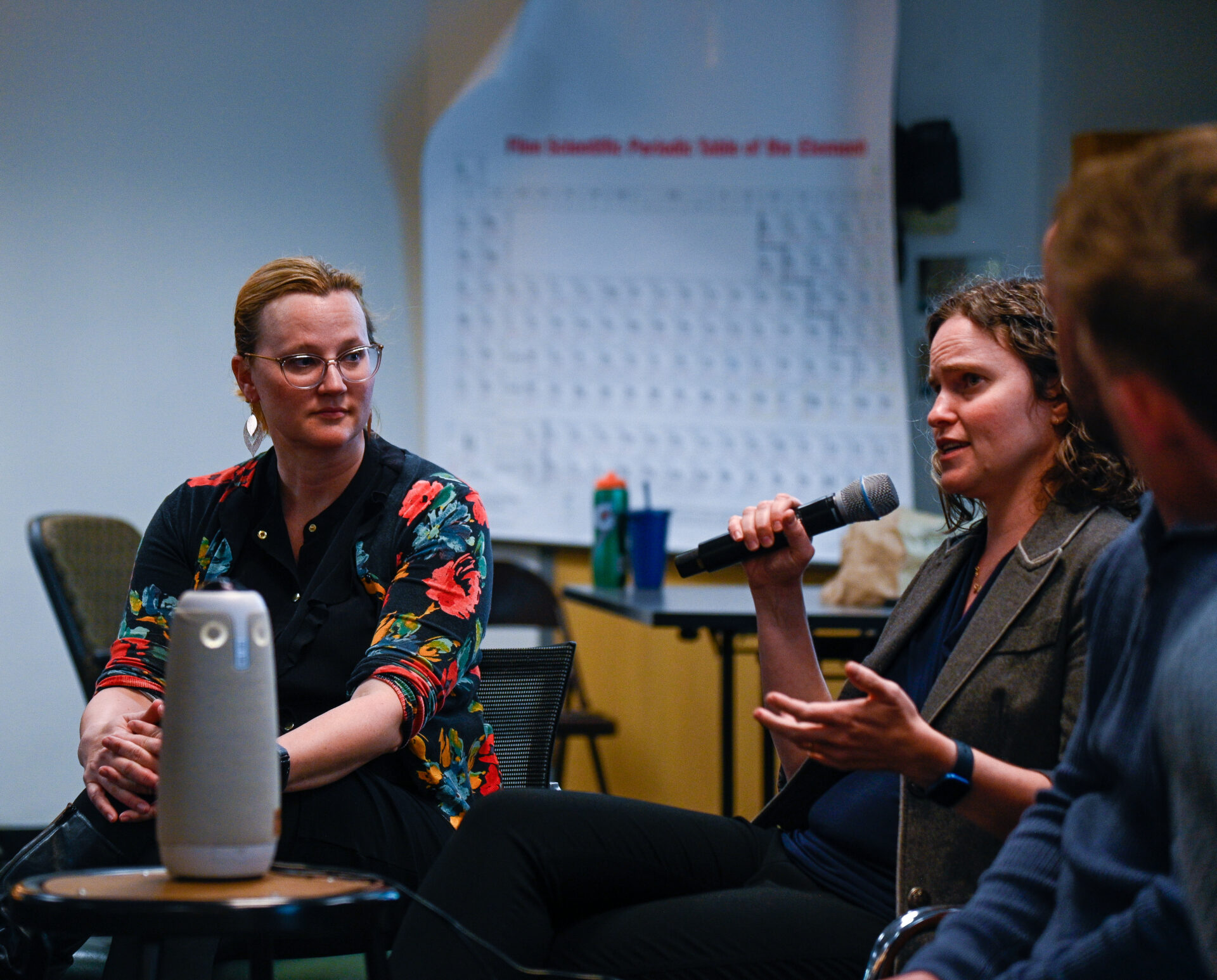By Bell Piccirillo

Photo by Bell Piccirillo
In a discussion at the University of Colorado Boulder, a panel of experts convened to explore the intricate connections between American politics and the ongoing war in Ukraine. As the U.S. election approaches, four distinguished voices — spanning political science to public activism — shared insights on how the electoral outcome could redefine American support for Ukraine and influence the nation’s identity in the face of relentless Russian aggression. This inaugural panel aimed to bring Ukraine back into the conversation, sparking crucial dialogue at a time when awareness is more vital than ever.
The panel included Dr. Christopher Jorde, a professor of American and Western European politics; Dr. Erin Hutchinson, a professor of history specializing in Eastern Europe; Dr. Sarah Sokhey, an expert in Ukrainian and comparative politics; and Stan Boretski, a public relations activist for Ukrainians of Colorado. Spearheaded by Katherine Grisak, commonly known as Katya, a sophomore and co-president of the CU Ukrainian Club, this panel was aimed to “bring [Ukraine] back into the conversation, especially in context of the election,” highlighting how the American political climate could influence the future of U.S. support for Ukraine.
The war in Ukraine originally stems from complex historical, political, and cultural tensions between Russia and Ukraine. Beginning in 2014, it was when Russia annexed Crimea, a move condemned internationally and met with sanctions, that triggered an ongoing conflict in Eastern Ukraine, where Russian-backed separatists clashed with Ukrainian forces. In Feb. 2022, Russia launched a full-scale invasion, aiming to assert control over Ukrainian territories, which led to a humanitarian crisis and international condemnation.
The U.S. initially became involved in the conflict through its support for Ukraine, providing military aid, financial assistance and imposing sanctions on Russia. This support is often framed as part of a broader commitment to NATO allies and the defense of democracy. Dr. Sokhey and Dr. Jorde broke down the nature of this aid during the panel, emphasizing that much of the financial assistance stays within the U.S. economy despite the common American perspective.
“We kind of have this idea that it’s like a check or, you know, we fly a plane over and kick a crate of cash out, or something like that. But yeah, really, what it is is, you know, around 50% last I checked, was basically us investing in American military equipment, and then we’re giving them essentially old stuff,” Dr. Jorde said, later emphasizing that around 50% of the aid involves investments in American military companies like Raytheon, with oversight to ensure transparency.
The panelists then shifted to discuss how American political dynamics are more likely than not to alter U.S. support for Ukraine. The upcoming presidential race between Kamala Harris and Donald Trump features stark differences in their stances on the conflict. While Harris has been softer on the issue than what it seems that voters are in favor of, Harris has pledged to stand “strong with Ukraine and our NATO allies,” accusing Russia of “crimes against humanity” during a speech at the Munich Security Conference. She warned that if Trump were re-elected, “Putin would be sitting in Kyiv right now.”
On the other hand, in a bold remark, Trump has suggested he could end the war in 24 hours, claiming that Putin wouldn’t have invaded Ukraine if he were to still hold the presidency. When pressed in the Sept. 2024 presidential debate, Trump refused to specify whether he wanted Russia to win, simply stating, “I want the war to stop.”
Dr. Jorde highlights the implications of such contrasting positions.
“We’ve seen that if Trump were elected again, it might mean a fundamental shift in how we approach aid to Ukraine and our broader strategy in Eastern Europe,” he said.
He cautioned that this change could impact not only military support but also the broader diplomatic dynamics in the region in a negative way for Ukraine.
Stan Boretski, a Ukrainian activist on the panel and recently back from spending time in DC working on the Stand by Ukraine act, shared the struggles he faced in rallying support for Ukraine. He described a personally troubling conversation with Congressman Greg Lopez.
“The congressmen compared that to the situation on the US Mexico border, saying that there is an invasion here as well. So, we don’t need to care about this invasion and Ukraine, it is far away, and there is no end in the war,” Boretski said.
Boretski believes that “Putin is watching these races so closely” and that if U.S. support wanes, it could provide an opening for Russia to escalate its aggression. He went on to admit that the Ukrainian community remains deeply concerned and want to see the conflict through to a resolution, despite the fatigue felt by many Americans. Boretski was also open to speaking candidly about divisions within the Ukrainian American community regarding the U.S. election.
“Personally, I am afraid. I am really worried right now because this race is so tight. I am afraid of Trump becoming President. As a Ukrainian that’s scaring me for both sides,” Borestki said. “Of the community, I have been to Florida recently a few times and I’ve been to Nevada, talking to many Ukrainians and I would say I met more people supporting Trump than Harris and there’s a few reasons for that. Ukrainians who recently came from Ukraine come from conservative and homophobic societies and anything that is close to the LGBTQ scares them a lot and they are running away from that and into the hands of Trump.”
Inside the Ukrainian Club

Photo by Bell Piccirillo
Katya Grisak played a pivotal role in organizing the event. As co-president of the CU Ukrainian Club, she had long envisioned a way to raise awareness about Ukraine on campus.
“I had this idea for a while of doing an academic-related event,” she said.
Grisak hoped the panel format could tackle the topic in a way that felt both accessible and impactful.
Bringing the panelists together wasn’t easy.
“I almost didn’t get a room,” she said, recounting the coordination challenges.
Grisak reached out to Dr. Sokhey, her Ukrainian politics professor, who suggested potential panelists and connected her with other faculty members. From there, Grisak’s efforts grew into a fully realized event with a robust discussion.
Despite the small size of the CU Ukrainian Club — just five steady members — Grisak remains determined to amplify Ukraine’s story on campus.
“Over time, you’re kind of living in a double world, where you know this reality and it’s very present for you and everyone else has forgotten about it,” Grisak said. “The summer before 2023 we actually visited my grandparents in Ukraine, and I would go to friends, and I’d be like, What are you doing this summer? [and I would say] Oh, I’m going to Ukraine. And they’re like, cool. Have fun. [and I said] Have fun? That’s a war zone! There is air raids like, I wasn’t, you know, I didn’t want to dig for pity, but at the same time, it was just really jarring that so many people had forgotten. And I never could.”
The Fight for Recognition and Support
The panel also addressed how Ukrainians define themselves, especially in the face of ongoing Russian aggression. Dr. Hutchinson highlighted the role of language and identity, explaining that “Ukrainian language was banned for a certain time,” contributing to a cultural divide. Boretski spoke to the resilience of Ukrainians, asserting that he doesn’t know any Ukrainians who would consider compromising on their fight for sovereignty.
Dr. Hutchinson noted the role of “political fatigue” in influencing public perception, explaining that “as the war drags on, many Americans become less engaged.” This, she said, makes events like Katherine’s panel crucial for raising awareness and fostering dialogue.
As the U.S. election approaches in just a couple of weeks, the fate of American support for Ukraine hangs in the balance, with Ukrainians closely monitoring the outcomes. For Grisak and the rest of the CU Ukrainian Club, the event served as a vital attempt and opportunity to keep the war — and the lived experiences of those enduring it — at the forefront of CU’s mind.

